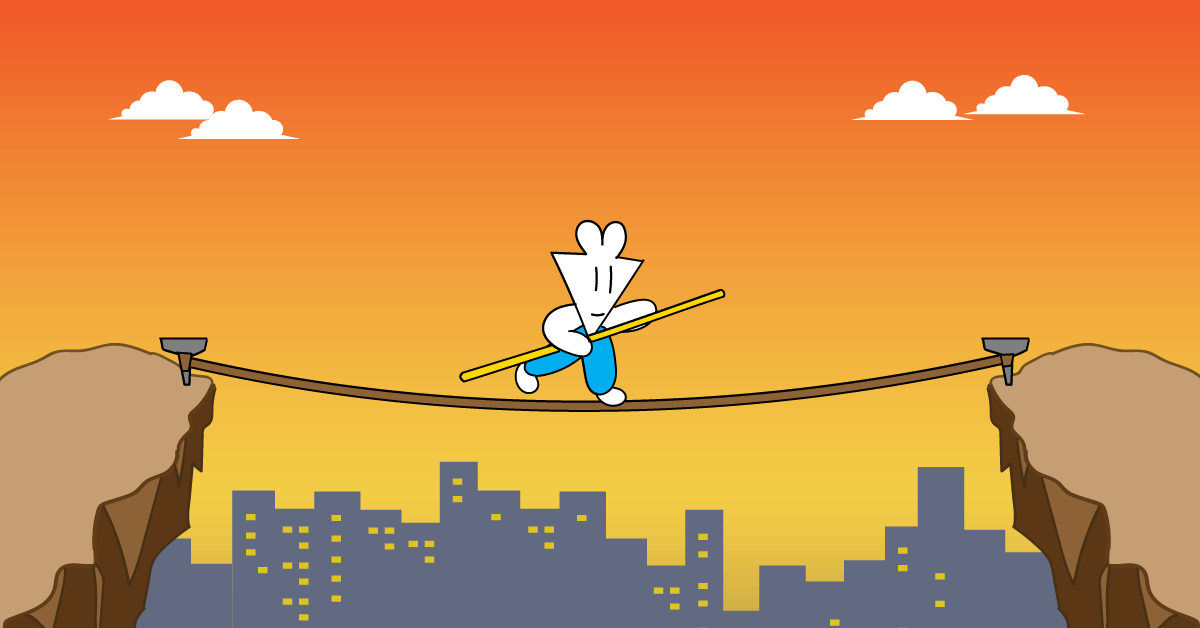The Tightrope of Discipline
The comedian Tim Dillon was once asked about Jocko Willink’s book, Discipline Equals Freedom. The interviewer wanted to know if Tim thought that discipline was important to cultivate, and if it was a key ingredient to his success.
To that, Tim quipped, “Hey, how about freedom equals freedom? Has he ever thought of that?”
Comedians are the great philosophers of our day, primarily because humor is all about framing wisdom in an absurd way. And Tim’s response is a great example of this dynamic in action.
Discipline is often touted as a great virtue, as it’s the only way for us to fight the forces of disorder. Attention is a famously fragmented thing, so our ability to unify it is the core tenet of productivity culture. Focus is nothing more than a concerted effort to push back against entropy, and discipline is the glue that holds it all together.
Knowing this, it makes sense that discipline is held in such high regard. But Tim’s quip shines a light on the absurdity of the situation when he questions what all this discipline is for. If the ultimate goal is freedom, can’t we simply embody that now instead of using ambition to get there? By doing whatever the moment calls for, aren’t we living examples of the freedom that we so desperately want to achieve?
The Daoists summarize their response to this question through the concept of wu-wei, which roughly translates to “effortless action.” The belief is that the world we occupy is already in harmony, but this equilibrium is disturbed by our endless desires and wants. So in order to restore this balance, we are to navigate the world according to how it already is, instead of attempting to bend it to our will. It’s to swim with the current of the river to see where it takes us, rather than fighting against it to go to a destination we already have in mind.
The reason why wu-wei is compelling is because it doesn’t discount the importance of action. You still have to show up and be present for whatever experience you are entering, and if anything, the awareness of your mental state is elevated. But the difference here is that your action isn’t driven by a self-interested motive; rather, you are simply easing into the fluidity of the moment and seeing what happens.
A disciplined mind, however, is often the antithesis of this dynamic.
Discipline is our way of actualizing a vision we want to attain in the future. It almost always arises as a function of desire, and begins with the end in mind. We wake up early to exercise – even when we’d rather not – so we can become fitter versions of ourselves. We make things for an hour each day – even when we’d rather not – so we can actualize our creative potential. We sacrifice the comfort of the moment so we can build the resilience required for a better future, and anything that focuses on the horizon instead of one’s current position is a byproduct of ambition.
Ambition has its merits and pitfalls, but the key thing to consider is the texture of restlessness that accompanies it. If your mind is constantly occupied by what you have to do next, then you are always living for some imagined state. Simply put, you will never “arrive,” and any belief that reaching a goal will bring lasting peace will prove to be illusory.
But if your ambition is directed to a pursuit that has no concrete end state, that means that the endeavor itself is meaningful on its own. The restlessness you feel is the result of a challenge you deem worthwhile, as partaking in it allows the boundaries of your mind to expand with each attempt. Your ambition is not directed toward a future state, but rather toward making the most out of the moment you occupy now.
Walking the tightrope of discipline is just as intricate as navigating the boundary between the present and the future. Discipline is beautiful when it allows you to make the most of a given moment, but loses its utility when you only think of who you might one day be. Discipline can be used to show up regularly for what matters, but it’s only through acceptance where you can be content with whatever the current moment has to offer.
_______________
_______________
For three more stories and reflections of this nature:



